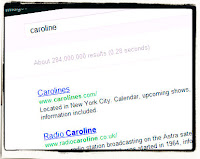Why Googling Baby Names May Be a Waste of Time
Techcrunch's Alexia Tsotsis wrote recently in But What If You're Un-Googleable "In third grade being the unique and uncommon 'Alexia Tsotsis' sucked, but, in adult life I’m all like,”Hell yeah, I’ve got the first slot for my name in Google!” As the only Alexia Tsotsis in the world right now I feel pretty damn good " With very much the same idea in mind many parents now google potential baby names, screening both for names with unpleasant connections and anything that is too common. This was even reported in the NY Times recently in What's In a Name? Ask Google.
I would agree that it seems a sensible precaution to make sure that the name you have chosen isn't extremely common -- though in some countries this is harder than others -- and also to avoid any unfortunate clashes with notorious people, products or brands. But while this check probably makes the parents feel better it is not likely to do much good for the child.
Assuming that your child is born this year you probably don't want people googling them much while they are still very small. Most likely the whole issue of googleability will not really become important until they start looking for work or trying to get into a top school. This means that they will not be using their hopefully unique, clash-free name until about 2030. Meantime many other children have been born and named, possibly with the same name, and some adult with the same name might have earned their place in criminal history. Perhaps also someone has launched a new brand of toilet cleaner with exactly the same name.
What could also happen is that the name you rejected because of some conflict issue actually turns out to have been perfectly usable. Someone once told me her mother had rejected the name "Caroline" fearing that it would always remind people of Caroline the Cow. Yes, that Caroline the Cow that appeared in three early black and white Disney cartoons. Not many people are talking about her now.
Even more likely is that by 2030 Googling could be completely irrelevant. Today we rely almost entirely on crude search technologies that simply match alphabetic strings. Two decades into the future this might seem as quaint as looking for people in the phone book. What is going to happen between then and now is hard to predict, but what we do know is what we have today -- both technology and laws.
In 2030 our children are unlikely to be typing words into a search engine unless they work in a museum. Looking at where Siri is today it seems more likely that we will be asking a natural language digital assistant for help, and in this case other factors will come into play. There are also some alternative scenarios based on a change in the way we identify people. Today most people have a first name and a last name, but this is a fairly recent innovation. Just a few generations back most people were named after their fathers, so that James son of John would be James Johnson, and his son Alan would be Alan Jameson.
So go ahead and screen all your candidate baby names on Google if you want. This could potentially avoid your child some embarrassment thirty years from now, but this might just be a waste of time. Checking for conflicts with other languages might be a much better use of your time, but that's an issue we'll discuss another day.
+
Related posts on Branding and Reputation Management:
Choosing Pronounceable Brand Names: Lessons from the Cuil Saga
Five Simple Steps to Improve Your Online Reputation
Branding in the Age of Search Engines
Why Having Accounts on Photo Sharing Sites Is Good for Your Image
Sign Up Now: Joining New Networking Sites Boosts Brand, Reputation
Lectures, Workshops & Coaching
For one-to-one coaching, lectures and workshops on this topic see andrewhennigan.com or contact me at conseil@andrewhennigan.com or by phone on 0033 6 79 61 42 81.
If you have any problems fixing your search results or you are just too busy to do it yourself then contact me to ask about fast, inexpensive remote coaching options. I can provide personal advice by mail, chat, phone, videoconference in small manageable blocks of time. See http://andrewhennigan.com/coaching.htm for more details.



Comments